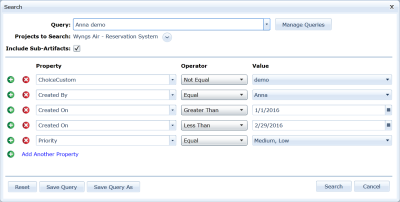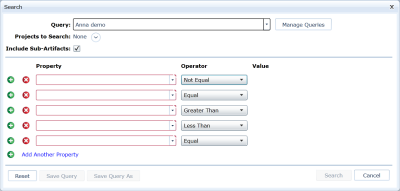Global Search
Overview
Using the search toolbar near the upper-right of the main Blueprint interface, you can perform different types of searches, ranging from a quick artifact look-up within an open project, to a cross-project search based on several intersecting project-property queries.
Quick Search
Entering a term or phrase in the Search field produces a list of matching instances among artifacts in the current project, or all open projects. The search is performed against any textual artifact property, and the Name, Label, and Description fields of sub-artifacts.
Using a wildcard character (*) in a search term expands the scope of the search, with a potential compromise in search speed.
Advanced Search (Queries)
With an advanced search, you can execute a more focused search by using a broader set of criteria. An advanced search is based on a query that combines one or more searches for a qualifying value of a specific artifact property.
Consider the following example:
This query looks at artifacts from a specific project. It finds artifacts that have been created by a specific Blueprint user, have been created within a two-month time frame, contain a specific custom property, and are set at a specific priority level. Only artifacts that meet all of these query criteria are included in the list of results.
Search Scope
The search scope is completely user-defined:
- You can Select Projects that will be searched by clicking their corresponding check boxes.
To assist with selections, clicking a folder automatically selects all of its child projects, and entering a project name in the Search box refines the list to matches. - You can also search All Open Projects to perform a search within all projects listed in the Explorer at the left of the main interface, or search All Projects that you have permission to access.
- Include Sub-Artifacts to apply any queries on Name, Label, and Description properties of sub-artifacts.
Operators
The operator that defines the searched property value is context-sensitive; the choices available in the Operator list depend on the Property selected (similarly, the Value format is also dependent on the type of property):
- Contains: Returns items that have a full or partial match for the specified value.
- Equal: Returns items with the specified value.
- Not Equal: Returns items that do not have the specified value.
- Empty: Returns items that do not have data for the specified property.
- Is Not Empty: Returns items that have any data for the specified property.
- Greater Than: Returns items that have occurred after the specified date or are greater than the specified number.
- Less Than: Returns items that have occurred before the specified date or are less than the specified number.
Project Confidentiality
Queries that have been shared by users are visible to all other users on the same Blueprint instance. However, to use, edit, or even view details of a query, a user must also have permission to access the projects with which the query is used.
If a user selects a query that belongs to a project they do not have access to, any selected project names, as well as artifact property searches are hidden. Users will also not be able to save a copy of the query. Consider the previous example query, now viewed by a user who does have permission to access the corresponding project:
Note that queries that are defined to search multiple projects will only be accessible to users to have access to all of these projects; even if they have access to all but one of the projects in the search scope, they will still not be able to use or modify the query.
Query Management
All users have the ability to create and manage queries. Queries can be private, user-exclusive searches, and can also be shared with all other project users.
Users can manage queries they own by renaming them, and changing their shared status. Users can only modify queries that they have originally created.
An existing query can be used to build a new one. The searches that make up the query can be modified or removed, and new searches can be defined and added to the existing set.
Search results
After you submit search criteria, search results open in a new tab. You can filter and sort search results like you would sort and filter artifacts in an artifact list.
Each search result shows up on a new line with the following details:
- Project Name
- Name
- ID
- Artifact Type
- Artifact Path
- Created By
- Created On
- Last Edited By
- Last Edited On
- Project Path
By default, the search results are limited to 1,000 results and are sorted in order of last modified time and date. The default search-result limit can be reduced to ease load, or increased to accommodate wider searches. The result order can similarly be modified for quick searches only. Contact your instance administrator for information on making the appropriate changes to the Blueprint web.config file.
Tip: You can export your search results to a Microsoft Excel file by clicking the Artifact List View button on the ribbon (Import/Export tab, Export group). You must save it as a .xls or .html file in order to open the file later.





